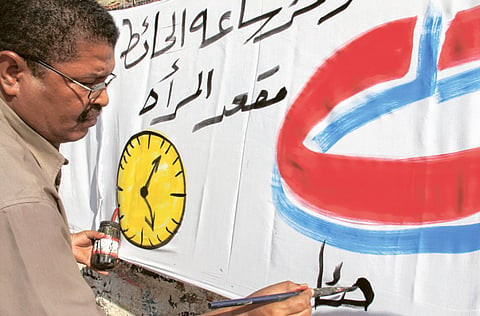Election fever in Egypt infuses new life into calligraphy
Artists get work painting campaign signs despite digital poster influx

Cairo: For Ashraf Shawqi, the election season is integral to his vocation's survival. He worries that the art is dying out due to the "computer invasion". For the last four months, Shawqi has been preparing to capitalise on the run-up to Egypt's legislative elections on November 28.
"This is a great season for calligraphers, which comes every five years," says Shawqi while painting a campaign poster on a wall in northern Cairo.
"I have been in this profession for 10 years. I usually paint such campaign signs during the municipal elections and those of the Shura Council [the upper house of the Egyptian Parliament]. Still, the legislative election is when we, the calligraphers, do brisk business," he told Gulf News.
More than 5,000 candidates belonging to political parties or contesting independently are vying for seats in the new legislature this month in elections seen as crucial for Egypt's presidential elections next year.
Shawqi, 31, does not mind the political affiliations of his customers from parliamentary aspirants.
"After all, it is business. I work for different candidates," he said, admitting, however, that those belonging to the ruling National Democratic Party and supporters pay more money than the others.
"Still, our trade faces threats from non-specialists, who want to get a piece of the cake during the election season. Those intruders try to attract candidates by cutting prices," Shawqi says.
Another threat in his view is that posed by digital posters. "Some candidates prefer to do business with publicity offices using the computer because they produce colourful posters."
According to Shawqi, a five-metre-long banner painted on cloth costs around 150 Egyptian pounds (Dh100) compared to 200 pounds for a digital poster of the same size.
Campaigning intensifies
A few days before Election Day, parliamentary hopefuls have intensified their campaigning. So Farid Mustafa, another calligrapher in northern Cairo, spends more than 14 hours a day in order to produce more bunting.
"We are usually commissioned by candidates' aides to supply them with banners. An efficient calligrapher should have a distinguished handwriting. Moreover, he should think of catchy phrases to attract voters' attention. He should know best which banner should be hung where to make the greatest effect," he told this newspaper.
Mustafa said he is working for different candidates except for those of the Muslim Brotherhood, Egypt strongest-but-banned opposition force.
"They have their own campaigners and calligraphers apparently for security reasons."
The group, whose candidates run as independents, has said it has been the target of a harsh police crackdown resulting in the detention of scores of its members.



